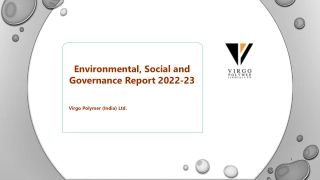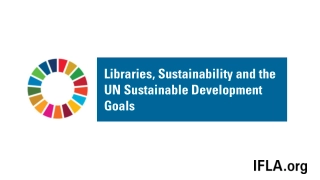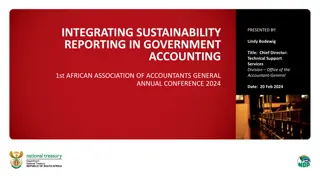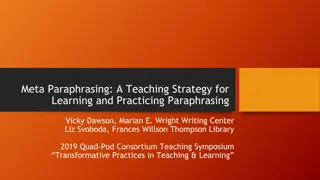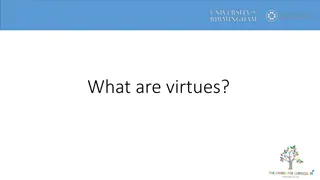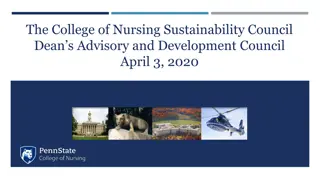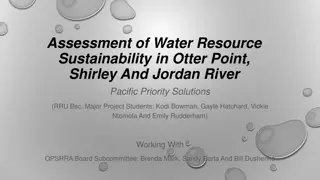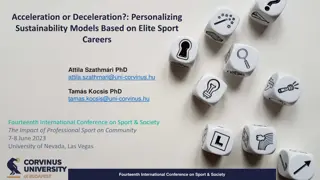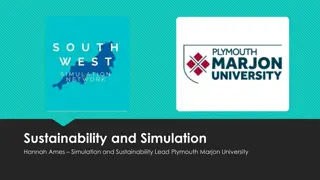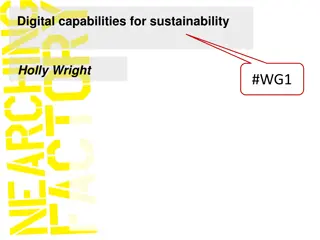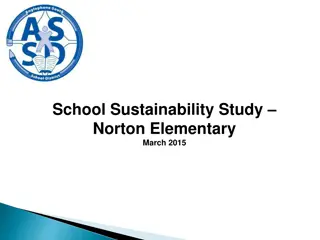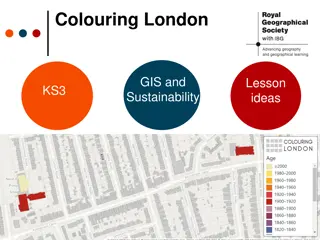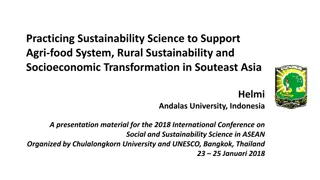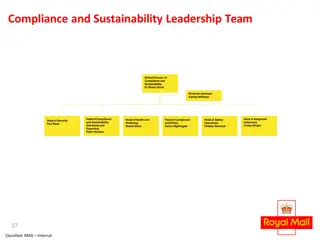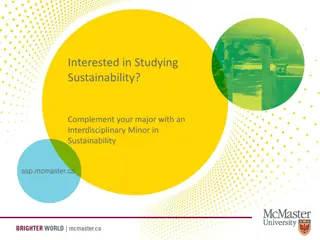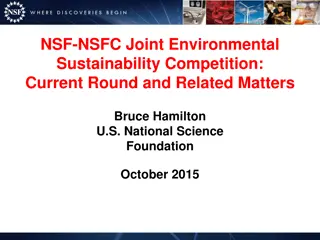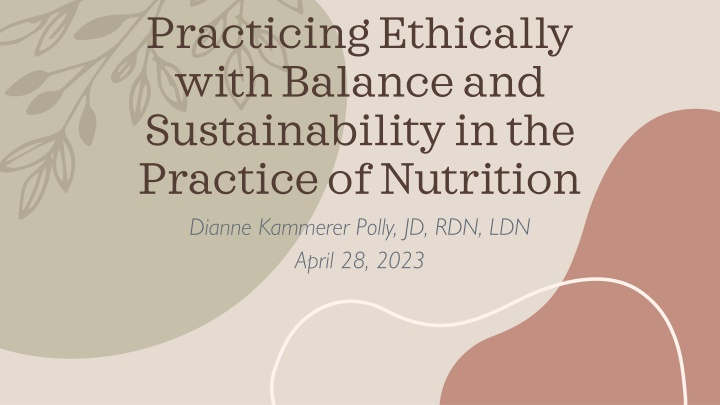
Practicing Ethically with Balance and Sustainability
Delve into the realms of personal and professional ethics, harness critical thinking to resolve ethical dilemmas, and understand the ethical principles surrounding sustainability. Unravel the process of lodging an ethics complaint and explore the significance of ethics education in various health professions.
Uploaded on | 2 Views
Download Presentation

Please find below an Image/Link to download the presentation.
The content on the website is provided AS IS for your information and personal use only. It may not be sold, licensed, or shared on other websites without obtaining consent from the author. If you encounter any issues during the download, it is possible that the publisher has removed the file from their server.
You are allowed to download the files provided on this website for personal or commercial use, subject to the condition that they are used lawfully. All files are the property of their respective owners.
The content on the website is provided AS IS for your information and personal use only. It may not be sold, licensed, or shared on other websites without obtaining consent from the author.
E N D
Presentation Transcript
Practicing Ethically with Balance and Sustainability in the Practice of Nutrition Dianne Kammerer Polly, JD, RDN, LDN April 28, 2023
Distinguish between personal and professional ethics Use critical thinking skills to resolve potential ethical case studies State which basic ethical principles and standards apply in various case studies regarding sustainability issues Understand and explain the process to pursue an ethics complaint Objectives After this session, you will be able to:
Our Code of Ethics Applies to You Members of Academy and those credentialed by CDR Members of Academy who are NOT credentialed by CDR All CDR credentialed practitioners whether or not members of Academy Current Code of Ethics effective June 1, 2018
Ethics Committee Three members Comprised of members of the Academy and the CDR House of Delegates Member, Board Member and CDR Representative Appointed to handle all relevant ethics matters Outside counsel assists committee as needed
Why do we need ethics education? Nearly all major health professions have a code of ethics Even attorneys require 3 ethics hours a year Separates health professionals from the quacks Assures members practice ethically or be disciplined Codes provide guidance to practitioners in their professional practice and conduct GUT CHECK
A few definitions Ethics Personal vs Professional Integrity: the quality of being honest and having strong moral principles; moral uprightness. Values: A person s principles or standards of behavior; ones judgment of what s important in life. Morals: Persons belief of what is right or wrong Legal
Situational Ethics Situational ethics Situational ethics, or situation ethics context of an act when evaluating it ethically, rather than judging it according to absolute moral standards. In situation ethics situation ethics, within each context, it is not always a universal law that is to be followed, but dependent on that particular event. situation ethics, takes into account the particular
Personal vs Professional Ethics The differences and similarities between personal and professional ethics can be hard to assess. Some people define personal ethics as conscience and professional ethics as a standardized code. Others define ethics, in general, as moral guidelines and say that personal and professional ethics are just different ways to apply a single moral code. Professional ethics are agreed upon by entire professional membership. Members adhere to their Code of Professional Ethics or Conduct
Code of Ethics Preamble Core values of customer focus, integrity, social responsibility and utilization of best evidence/research Primary goal is the protection of the individuals, groups, organizations with whom we work All nutrition and dietetics practitioners (Academy members, CDR credentialed) agree to abide by the Code
Principles and Standards Competence and professional development in practice NON-MALEFICENCE Integrity in personal and organizational behaviors and practices AUTONOMY Professionalism BENEFICIENCE Social responsibility for local, regional, national, global nutrition and well being JUSTICE
Competence and professional development in practice NON-MALEFICENCE Evidenced based practice In depth scientific knowledge Participate and use validated research Seek counsel and or referrals when needed Act in caring and respectful manner Practice within limits of your scope and collaborate with inter- professional team
Integrity in personal and organizational behaviors and practices AUTONOMY Disclose conflicts of interest Refrain from accepting gifts or services Comply with laws and regulations (including intellectual property rights) Maintain credentials Provide accurate and truthful information Report inappropriate behavior by peers Document, code and bill accurately
Autonomy Continued Respect patient/client autonomy; confidentiality Implement measures to protect health information 20XX presentation title 13
Professionalism (BENEFICIENCE) Participate in and contribute to decisions that affect well being of patients/clients Respect colleagues and other professionals Civility and professionalism in all communications (social media) Refrain from false, unfair claims Uphold professional boundaries, no romantic relationships Refrain from verbal, physical, emotional, sexual harassment
Professionalism/Beneficence cont Objective evaluations of performance of employees, coworkers, peers, etc. Communicate at appropriate level to promote health literacy Contribute to advancement and competence of others
Social Responsibility for local, regional, national, global nutrition and well-being (Justice) Collaborate with others to reduce health disparities Promote fairness and objectivity with fair and equitable treatment Contribute time and expertise to activities that promote the profession Promote unique role of RDN s Engage in service that benefits the community and publics trust in RDN s Seek leadership opportunities in professional, community and service organizations
Approach to ethical decision making Step 1: State an Ethical Dilemma Step 2: Connect ethical theory to the dilemma in practice by employing four principles of ethical theory: Identify the problem; generate alternatives; decide on course of action; implement). Step 3 Apply the Code to the issue and your ethical decision making
Ethical decision making cont Step 4 Select the best alternative and justify your decision Step 5 Develop strategies to successfully implement the chosen decision Step 6 Evaluate the outcomes and how to prevent a similar occurrence
Is it really an ethical issue? Ethical Issue? Violation of our code Business Issue? Business disputes or breach of a contract obligation Legal Issue? State and federal law violations Employment Issue? Disagreements with supervisors, hours worked, misusing an employers assets
What type of issue? May be more than one An RDN claims she guarantees weight loss if you hire her? Your supervisor requires you to do something you do not want to do? Your supervisor asks you to have employees work extra time without punching their time clocks. Your colleague is selling diet products to lose weight to all her patients? An RDN in your office gets a DUI? Your patient refuses to eat and this decision will result in her death?
How to file an ethics complaint Form is found at: https://www.eatrightpro.org/practice/code-of- ethics/what-is-the-code-of-ethics/ethics-complaints-and- violations Must be signed, notarized and mailed to CDR and the Academy Why is this important? Remember the purpose of ethics is to protect patients/clients and the public served by Academy/CDR members; the COE is not designed to address personal issues. JAND, July 2021, Volume 121
Introduction to ethics and sustainability for RDN s Lots of definitions A goal of ethical sustainability is to think of how humans ought to live while also considering their connections with other humans, the natural world, and future generations. Without these considerations, certain groups may feel marginalized or that they are not being treated fairly.
MARK RIFKIN, MS,RDN SUSTAINABLE DIETARY PATTERN SPECIALIST, PLANT-BASED REGISTERED DIETITIAN, INFLUENTIAL COMMUNICATOR I do not believe we have clear definitions currently in place for determining what practice (s) is more sustainable. Measurement metrics are important. In nature, nothing is truly waste.
primary goals & challenges
Goals Lots of ideas and lots of discussion but solutions? Use natural resources efficiently; but what are the appropriate metrics? Protect marine and water resources. Procure food ingredients from sustainable sources. Use environmentally efficient food packaging. Reduce food waste,
Major Concerns Ensuring a sustainable supply of food for the world s fast growing population is a major challenge. Food production is one of the key areas that requires action, alongside issues of food consumption, food waste, improved nutrition and food security. Food production will need to increase by 70% to feed the larger, more urbanized and most likely better off population. Food products will need to be nutrient-dense to provide a balanced diet and more food will have to be produced using less land. In addition, water and energy will become limiting factors. https://www.futurelearn.com/info/courses/food-supply-systems/0/steps/53673
Interesting and thought provoking questions regarding our food system Should humans continue to clear cut forests for the sake of human consumption? Should humans continue to make gas-powered vehicles to transport food? What environmental obligations do humans need to keep for future generations? How should humans best use and conserve the space environment to secure and expand life? Should industrialized countries be helping more developing countries? * Who is or who should be leading these sustainability concerns? Global Food Security; Volume 7, December 2015, Pages 9-14 Older article but great questions still being asked
Case studies/discussions Is this an ethics, legal, employment or business dispute issue? Which part of code relates? Key Issues to consider What is the best procedural way to handle the issue?
CASE STUDY ONE You are an RDN working at a WIC clinic. You believe organic foods are healthier and better for all people. Do you recommend your economically challenged clients buy organic?
CASE STUDY TWO You are the Director of the Health Department and the Food Bank has started a reclamation program to take excess food from restaurants and give to homeless shelters? You are concerned about food safety. You do not approve the program.
CASE STUDY THREE A new vendor wants your hospital business. He offers to give your physicians, dietitians and the head chef several nice tofu steaks and lobsters to take home to see if they could be used in the cafeteria. Do you accept them? What if the offer were for tasty new diabetic desserts from a local farm?
CASE STUDY FOUR You are in private practice and you have a patient undergoing chemotherapy and has asked you to ask the primary provider to write him an RX for marijuana and a new nutritional supplement on market? Do you support it?
CASE STUDY FIVE You are the purchasing manager for your institution, you decide to buy only local products from your son in law over even cheaper organic foods. Any ethical issues?
summary Ethics can sometimes appear gray The professional Code is more black and white Use the gut check if functional Remember the old girl/boy scout rule to leave your camp site better than you found it; lets do that with the EARTH What s on thing you might commit to do?
Questions? Thank you Dianne Polly diannepolly@gmail.com

